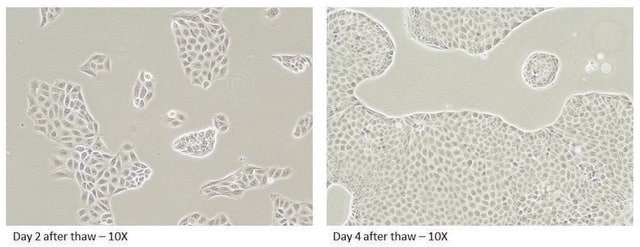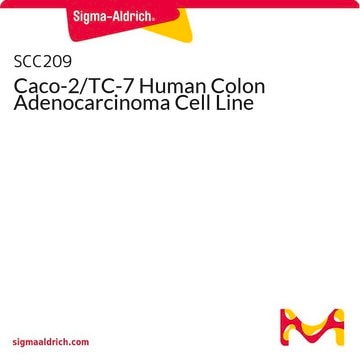MTOX1002
BCRP Knockout Caco-2 Cells
Human male colorectal tissue, adenocarcinoma
Sinónimos:
C2BBe1 Cells BCRP (-/-/-/-)
About This Item
Productos recomendados
product name
BCRP Knockout Caco-2 Cells, one vial
biological source
human male colorectal tissue (Source disease: adenocarcinoma)
Quality Level
form
liquid
technique(s)
drug transporter assay: suitable
permeability assay: suitable
OMIM accession no.
application(s)
ADME/TOX
storage temp.
−196°C
Gene Information
human ... ABCG2(9429)
General description
Application
Transporter Function in Caco-2 Cells with Targeted P-Glycoprotein, MRP2 and BCRP Gene Knockout Using Zinc Finger Nucleases
Comparison of Function and Relative Transporter Protein Concentrations in Caco-2 Cells with Single and Double Knockouts of the ABCB1, ABCG2, and ABCC2 Genes
Caco-2 Transporter Knockout Cell Based Assays
Features and Benefits
- A functional knockout of the BCRP gene eliminates the reliance on chemical inhibitors to determine if a compound is an BCRP substrate
- The vial format enables the BCRP knockout cells to be included in standard drug transporter protocols
- Human assay with no interference from animal inhibitors
- Overcome the limitations of RNAi and knockdown cell lines that arise from remaining transporter functionality
Legal Information
Disclaimer
Los componentes del kit también están disponibles por separado
- MTOX1002BCRP Knockout Caco-2 Cells, one vial 1 vialSDS
Storage Class
10 - Combustible liquids
wgk_germany
WGK 3
flash_point_f
Not applicable
flash_point_c
Not applicable
Certificados de análisis (COA)
Busque Certificados de análisis (COA) introduciendo el número de lote del producto. Los números de lote se encuentran en la etiqueta del producto después de las palabras «Lot» o «Batch»
¿Ya tiene este producto?
Encuentre la documentación para los productos que ha comprado recientemente en la Biblioteca de documentos.
Artículos
We presents an article on The Role of Intestinal Efflux Transporters In Drug Absorption.
We presents an article on The Role of Intestinal Efflux Transporters In Drug Absorption.
We presents an article on The Role of Intestinal Efflux Transporters In Drug Absorption.
We presents an article on The Role of Intestinal Efflux Transporters In Drug Absorption.
Nuestro equipo de científicos tiene experiencia en todas las áreas de investigación: Ciencias de la vida, Ciencia de los materiales, Síntesis química, Cromatografía, Analítica y muchas otras.
Póngase en contacto con el Servicio técnico








